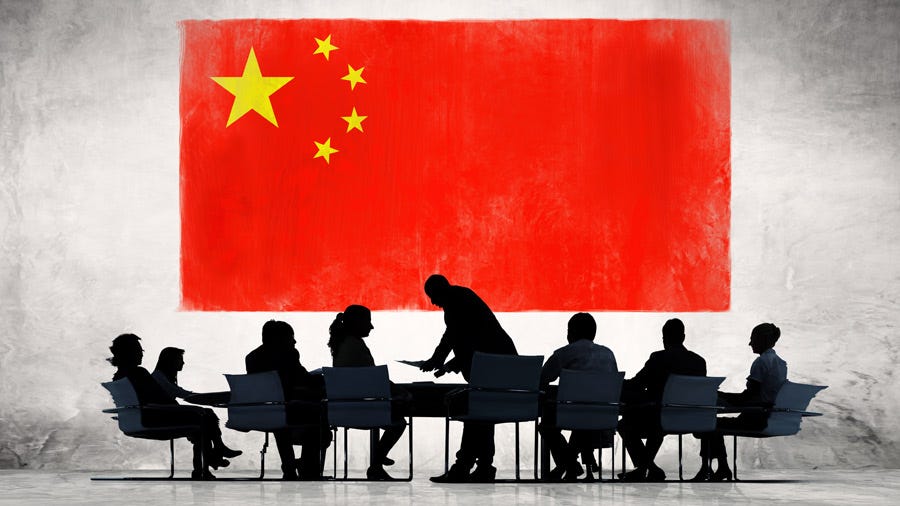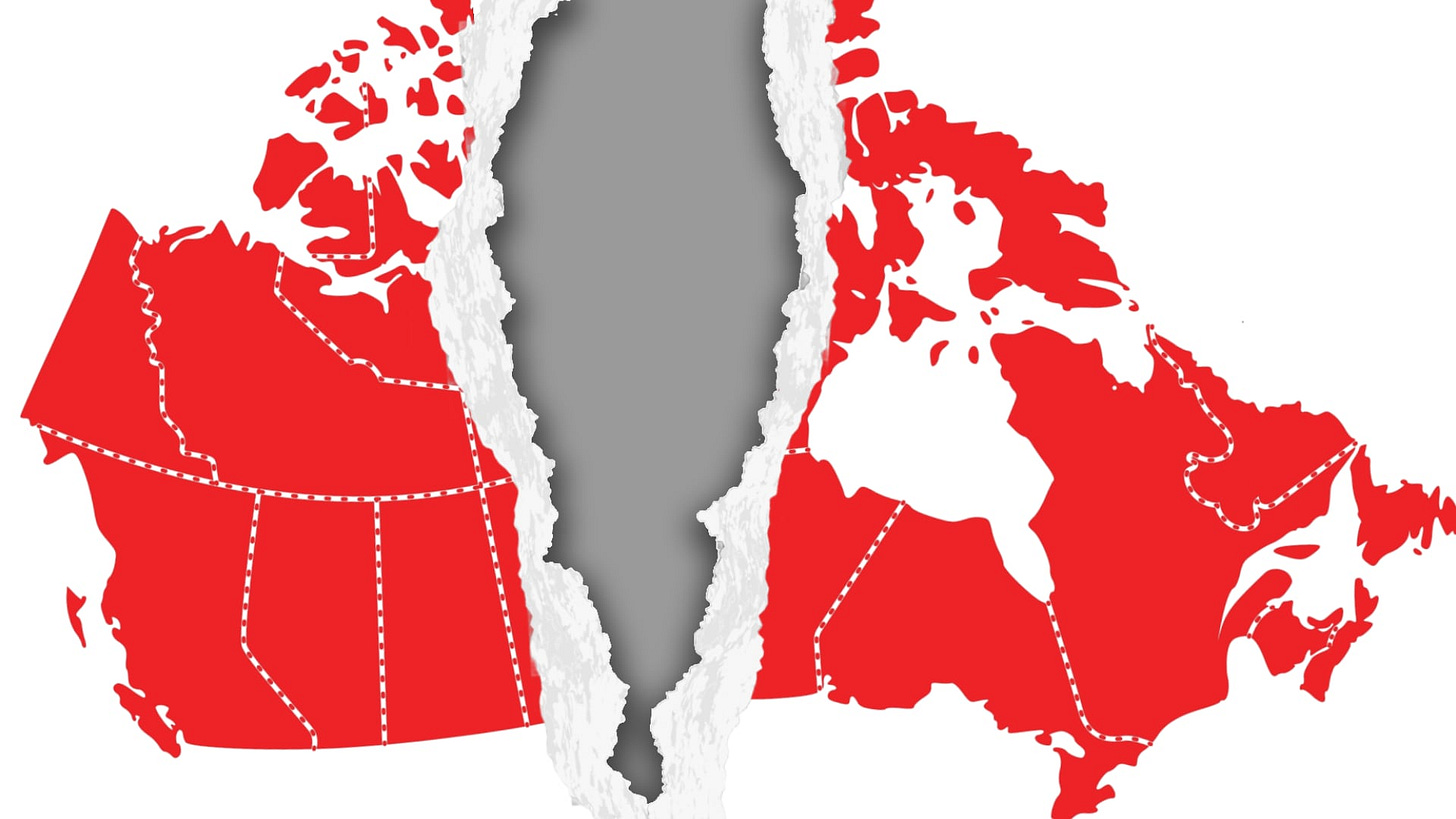Good morning, It’s Friday May 9th. In today’s news, The Bank of Canada warns that Canada lacks the economic resilience to endure a global trade war, China targets a Canadian political candidate as part of their ‘campaign of transnational repression’, Alberta separation now a bigger threat than Quebec, Robert Francis Prevost elected as first American Pope, and much more.
First time reading the daily blend? Sign up here.
Canada’s Economic Outlook: Tax Lies, Soaring Debt, and the Storm Ahead
For all the talk of tax cuts and financial relief, Canada’s economic outlook is not one of prosperity, but peril. The Bank of Canada is now openly warning that Canada does not have the economic strength to withstand a prolonged global trade war. Yet even amid these warnings, Ottawa continues to spend like it is business as usual.
Prime Minister Mark Carney’s government, having inherited a fiscal time bomb from Trudeau, is now lighting the fuse. Despite campaign promises of income tax relief, what Canadians are really getting is a deferral — not a reduction — of their tax burden. A symbolic cut from 15% to 14% on the lowest income bracket may look good in headlines, but the numbers don’t lie. The federal government is planning to spend $62.3 billion more than it takes in this year, funded entirely by debt.
This isn’t tax relief. It is tax procrastination. More borrowing today means more interest tomorrow — interest that must be paid with future taxes. Interest payments alone are expected to hit $54.2 billion this year, double what they were a decade ago. That’s money drained from Canadians, not to fund healthcare or public services, but simply to service past recklessness.
And the warning signs are everywhere. Nearly 60% of mortgage holders will renew this year or next — most at dramatically higher rates. Households without mortgages are already falling behind on credit cards and auto loans. Meanwhile, the Bank of Canada warns that a major shock, like a trade war, could trigger widespread defaults, strain the financial system, and send banks into retreat.
The danger doesn’t end with households. Hedge funds leveraging massive positions in government bonds are introducing serious instability into Canada’s financial bedrock. In a crisis, their rapid withdrawal could amplify volatility and erode liquidity across markets.
Canada is sailing into turbulent waters with a broken compass and a captain insisting the ship is unsinkable. We are not easing the tax burden. We are shifting it — kicking it down the road for the next generation while loading the economy with more fragility.
Canada isn’t just heading for a slowdown — it’s heading for a reckoning.
China Targets Canadian Political Candidate as Part of ‘Campaign of Transnational Repression’
In a rather troubling escalation of Beijing’s campaign to silence dissent beyond its borders, Hong Kong national security police have detained two family members of Joe Tay, a Canadian citizen and former Conservative candidate who has been an outspoken advocate for Hong Kong democracy.
According to Radio Television Hong Kong, Tay’s cousin and the cousin’s wife were taken from their home in Fo Tan on May 8th. The brief government-issued report did not elaborate on the nature of the investigation, though it is widely understood to be connected to Tay’s political activism abroad.
Tay, who ran for the Conservatives in the recent federal election, is one of several pro-democracy activists targeted by Hong Kong authorities under Beijing’s National Security Law. A warrant has been issued for his arrest, accompanied by a HK$1 million bounty (approximately CAD $180,000). He stands accused of “incitement to secession” and “collusion with foreign forces.”
This is not an isolated case. Just days ago, the father and brother of Anna Kwok, another prominent Hong Kong activist now based in the US, were also arrested under similar circumstances. Human rights group Hong Kong Watch has warned that the Chinese regime is ramping up what it calls a “campaign of transnational repression” targeting dissidents’ families to intimidate and silence critics abroad.
Tay's case has been particularly high-profile in Canada, especially after it was revealed during the recent federal campaign that Paul Chiang, a Liberal candidate in Markham-Unionville, had ‘jokingly’ suggested handing Tay over to the Chinese consulate to collect the bounty. Chiang later apologized and withdrew from the race, though Tay said “no apology is sufficient” and expressed serious concerns for his safety.
“These threats are the tradecraft of the Chinese Communist Party,” Tay said in a statement. “They are intended to send a chilling signal to the entire community and to force compliance with Beijing’s political goals.”
Canada’s election security task force confirmed in late April that Tay was the target of a coordinated disinformation campaign linked to Beijing. The operation involved amplifying messages about the bounty and Tay’s eligibility to run for office across Chinese-language platforms such as WeChat, TikTok, RedNote, and Douyin.
Tay ultimately lost the election in Don Valley North to Liberal candidate Maggie Chi by nearly 5,000 votes.
Alberta Separation Now a Bigger Threat Than Quebec
Canada is splintering—and for the first time in history, more Canadians are worried about Alberta leaving Confederation than Quebec.
A new Leger poll for the Association for Canadian Studies found that 52% of Canadians believe Alberta separation should be taken seriously—compared to just 42% for Quebec. The shift is unprecedented. For decades, Quebec was seen as the volatile province. Now, it’s Alberta, fed up with federal overreach, economic strangulation, and the continued siphoning of its wealth through equalization.
In Alberta, 63% of residents say the threat of secession is serious. But what’s most striking is how this sentiment has spread. Majorities in Ontario, British Columbia, and the Prairies all agree that Alberta separatism is no longer just a fringe fantasy. Even Atlantic Canada—historically less sympathetic to Western grievances—registered at 50%. The only outlier? Quebec, where just 46% think the Alberta threat is serious—perhaps because many still believe their own grievances are more just.
And yet, national unity under Prime Minister Mark Carney appears tenuous at best. Only 34% of Canadians believe his Liberal government will improve national unity. Among Conservative voters, that number plummets to 17%. In Alberta, more than half say the Liberals are making things worse, not better.
Even Liberal and NDP voters—traditionally dismissive of Western discontent—are beginning to acknowledge the validity of Alberta’s complaints. Nearly half of both groups say the separation threat deserves attention.
It gets worse. 52% of Albertans—and 58% of Conservative voters—believe the province has legitimate reasons to leave. Even in other provinces, a surprising number agree: 37% in Manitoba and Saskatchewan, and nearly one-third in Ontario and B.C.
What this shows is simple: this country is on borrowed time. The sense of shared nationhood has eroded. If Alberta’s demands continue to be ignored—on pipelines, taxation, autonomy, and resource development—then a referendum may not be hypothetical much longer. Source.
Robert Francis Prevost Elected as First American Pope
Cardinal Robert Francis Prevost has been elected as the new pope, taking the name Pope Leo XIV. The election took place on the evening of May 8, after a vote by the College of Cardinals, marking the end of the "sede vacante" period following Pope Francis's death in April. Pope Leo XIV, 69, is the first American pope, hailing from Chicago and having spent significant time in Latin America. His ministry included roles as the Archbishop of Chiclayo, Peru, and as a former superior general of the Augustinian order. In his first address, he called for global peace and unity within the Church. The election was greeted with cheers from tens of thousands of faithful in St. Peter's Square. More
FBI Has Launched 250 Probes Tied to Online Networks That Prey on Minors
The FBI is investigating at least 250 individuals connected to violent online networks, known as “764,” which target minors. These networks manipulate vulnerable young people, often aged 10 to 17, through platforms like social media and gaming apps, coercing them into producing explicit content, self-harm, or even attempting suicide. The FBI's investigation, which spans all 55 field offices, highlights concerns over blackmail and exploitation, with predators using fear and threats to control victims. In a recent five-day operation, the FBI arrested 205 suspected child-sex predators and rescued 115 children. More
The European Union Takes Aim at US Planes and Autos in €100 Billion Counterstrike Against Trump Tariffs - More
FBI Director Says Release of Epstein Files Coming ‘In the Near Future’ - ‘We will bring everything we find to the DOJ to be fully assessed and transparently disseminated to the American people,’ Kash Patel told a Senate hearing. More
‘Quit CCP’ Booth in New York Attacked After Receiving Terror and Bomb Threats - More
US Government Sanctions Chinese Entities Engaged in Iranian Oil Trade - More
India Destroys Lahore Air Defence System After Pakistan Tries to Attack Golden Temple - More
New US Bill Would Benefit Canadian Snowbirds, Allowing Them to Stay There Longer - More
Ontario Set to Begin Construction of Canada's 1st Mini Nuclear Power Plant
Premier Doug Ford’s government has approved Ontario Power Generation to begin building Canada’s first small modular reactor (SMR) next to the Darlington nuclear station. The $7.7 billion reactor—the first of four planned—will power 300,000 homes and help meet a projected 75% surge in electricity demand by 2050. Ontario will be the first to build GE Hitachi’s BWRX-300 design, with 80% of the project spend staying in-province. While critics question cost estimates, the project is expected to create 3,700 jobs annually and deliver $13 billion in tax revenue over 65 years. Completion is slated for 2030. More
US Weighs Plan to Lower China Tariffs to as Low as 50% - More
Bitcoin Rallies with Stocks to Top $100,000 Again as Confidence Returns to Markets - More
Breakthrough Solves Key Fusion Energy Barrier, Paving the Way for Commercial Clean Energy
A team of researchers has developed a groundbreaking method to fix magnetic flaws in fusion reactors, solving a decades-old challenge that has hindered progress toward practical fusion energy. By using symmetry theory to identify and seal “holes” in magnetic fields—where vital high-energy particles escape—this new approach is 10 times more efficient than previous models and could transform both stellarator and tokamak reactor design. The advance brings scientists significantly closer to commercializing fusion energy, offering a clean, safe, and virtually limitless alternative to fossil fuels. More
Scientists Discover Bacteria That Breathes Electricity—A Game-Changer for Green Energy - More
‘Mayor of Mayhem’: Netflix to Air Rob Ford Documentary Next Month
Netflix is set to spotlight the late Rob Ford, Toronto’s controversial former mayor, in a new episode of its Trainwreck docuseries titled Mayor of Mayhem. The anthology, known for chronicling bizarre and shocking public events, will trace Ford’s political rise from his 2010 mayoral campaign to the international media frenzy surrounding his 2013 crack cocaine scandal. Directed by Shianne Brown, the episode explores how Ford's chaotic tenure and personal struggles captivated the world. The Trainwreck series has previously covered infamous incidents like Woodstock ’99, the Balloon Boy hoax, and the Dutch “Project X” party that spiralled out of control. More
Boxing Legend Manny Pacquiao Ending Retirement to Face Barrios for WBC Belt - More
Every Celebrity Mentioned in Diddy's Trial So Far - List Here
Timberwolves’ Ownership Battle Heats up as Alex Rodriguez and Marc Lore Vie for Control Amid Off-Court Chaos - More
Chinese Car Dealership Introduces Humanoid Robots to Sell Cars
An Employee Who Was Compared to Darth Vader at Work Wins $40K in Compensation - the world has become so soft.
On This Day in 1960, the United States becomes the first country to legalize the birth control pill



















“Canada is sailing into turbulent waters with a broken compass and a captain insisting the ship is unsinkable.” Well put! Call it the Titanic Syndrome.